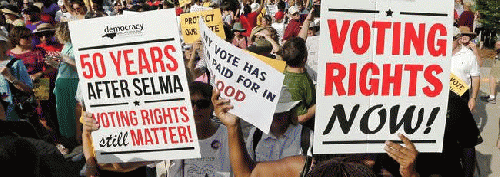With their government under the control of corporations and special interests, the People of the United States may think they have the right to vote, but, unfortunately, they do not. When the Constitution and the Bill of Rights were written, the authors intentionally omitted this very significant detail. They failed to include the right to vote, and the error has never been corrected.
Most Americans are unaware that they, unlike the citizens of most other democracies, do not have a basic constitutional right to vote. The constitutions of Germany and Japan adopted after World War II include a specific right to vote. Even in nations, such as Afghanistan, Iraq, and Syria--where Americans are fighting to impose democratic governments--the people already have a constitutional right to vote. Of 120 constitutional democracies in the world, only 11, including the United States, fail to explicitly guarantee a right to vote in their constitutions.
This critical omission from the Constitution was acknowledged by the U.S. Supreme Court in 2000, when a majority stated in Bush v. Gore: "The individual citizen has no federal constitutional right to vote for electors for the President of the United States unless and until the state legislature chooses a statewide election as the means to implement its power to appoint members of the Electoral College."
As the result of a series of amendments, people of color, women, and young people over the age of 18 cannot be deprived of the right to vote because of their status; however, nowhere in the Constitution does it say they have a fundamental right to vote in the first place.
Why the Right to Vote Was Omitted From the Constitution. Fearing an "excess of democracy," a majority of those who gathered at the Constitutional Convention decided to replace the Articles of Confederacy with a central representative government that preserved the power of the economic and social elite and left voting matters up to the states.
James Madison, the principal author of the Constitution and the subsequent Bill of Rights, publically stated the electors of the new government would be "the great body of the people of the United States." In private, however, he worried that, "In future times, a great majority of the people will not only be without landed, but any other sort of, property. These will either combine under the influence of their common situation; in which case, the rights of property and the public liberty will not be secure in their hands; . . ." John Adams was even more direct. In opposition to allowing electors other than property owners, he said "There will be no end of it. New claims will arise. Women will demand a vote. Lads from 12 to 21 will think their rights not enough attended to, and every man, who has not a farthing, will demand an equal vote. . . ."
The new constitution provided that members of the House of Representatives "shall be chosen every second Year by the People of the several States" and goes on to provide that the "Electors" shall have the same "Qualifications" as that for the "most numerous Branch of the State Legislature." In other words, each state determines who can vote for state and congressional representatives.
Composition of the Senate was even more closely controlled, in that Senators shall be "chosen by the Legislature thereof. . . ." Finally, the Constitution held that "The Times, Places and Manner of holding Elections for Senators and Representatives, shall be prescribed in each State by the Legislature thereof; . . ."
In electing the president and vice president, the Constitution imposed an even greater barrier between the "People" and the election of their principal representatives. The Constitution provides that "Each State shall appoint" presidential Electors "in such Manner as the Legislature thereof may direct. Thus, it is these "Electors" who actually vote in the "Electoral College" for the president and vice president. The result has differed from the popular vote four times in history, the last being in 2000.
Participation by the People in presidential elections--even today--is almost entirely at the discretion of the legislature in each state. States have enacted legislation allowing for primary and general presidential elections, but it is still the Electors who actually elect the president. The state legislatures still have the power to directly appoint presidential Electors without elections, and there is nothing in the Constitution to prevent it.
The Constitution and the Bill of Rights may not have included a specific right to vote; however, over the subsequent two centuries, the voting power of the People steadily increased and the United States republic gradually become more democratic.
Expanding the Suffrage. Initially, all states required voters to own property; however, Vermont began to allow all men to vote, and for a time, Tennessee provided universal male voting, including free blacks. Only New Jersey allowed the possibility of female suffrage; however, it was later revoked. Pennsylvania, New Hampshire, Delaware, Georgia, and North Carolina soon expanded the franchise to all taxpayers, but in 1800, the New Hampshire and Massachusetts legislatures suspended elections and directly appointed their presidential electors.
With westward expansion, voting was extended to include non-property owners. By the presidential election in 1828, there were 24 states, and they had all adopted free white male suffrage. The new Democratic Party represented the farmers and artisans against the business and financial interests. The Democratic candidate, Andrew Jackson--who believed even the poorest white male should be allowed to vote--ran against President John Quincy Adams. Three times as many white men voted in the election as did four years earlier, and most voted for Jackson.
Following the Civil War--and to ensure the vote of freedmen in the South for the Republican Party--the Fifteenth Amendment was enacted. It held that: "The right of citizens of the United States to vote shall not be denied or abridged by the United States or by any State on account of race, color, or previous condition of servitude." The corresponding Fourteenth Amendment imposed penalties on states whenever "the right to vote at any election" was "denied to any of the male inhabitants of such State. . . ."
The new constitutional guarantees of a freedman's right to vote, did not, however, improve the fundamental voting rights of all citizens. The states may not have been allowed to overtly discriminate on the basis of race; however, they could impose other restrictions on voting--which had the same effect. Democrats quickly regained political dominance in the southern states and passed "Jim Crow" laws effectively depriving African Americans of their right to vote or to hold office. These laws included discriminatory literacy tests, the imposition of poll taxes, and a "whites only" primary system.
(Note: You can view every article as one long page if you sign up as an Advocate Member, or higher).






